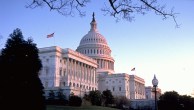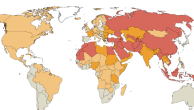Introduction and Summary
Americans Hearing about Iraq from the Pulpit, but Religious Faith Not Defining Opinions

Most American churchgoers are hearing about the issue of war with Iraq at their places of worship. But most say their ministers are not taking a position for or against the war, and relatively few people say their own views on the issue are being shaped by religious leaders or their own religious beliefs.
Nearly six-in-ten (57%) of those who regularly attend religious services say their clergy has spoken about the prospect of war with Iraq. But just a fifth (21%) say their priest or minister has taken a position on the issue. When churchgoers do hear a point of view, it mostly comports with the national stance of their religious faith: white Catholics and African-Americans are hearing anti-war messages, while white evangelical Protestants are getting a pro-war point of view.
But on balance very few people say their religious beliefs are shaping their views on Iraq, unlike the relatively large percentage who report this about social and moral issues like gay marriage, abortion, or the death penalty.
Just one-in-ten Americans cite their religious beliefs as the strongest influence in their thinking about the war, with supporters and opponents of military action equally likely to cite this as a factor (9% of supporters, 10% of opponents). Even among those who regularly attend religious services, fewer than one-in-five (17%) say their religious beliefs are the biggest influence.
These are the principal findings of a nationwide survey of 1,032 Americans conducted March 13-16 by the Pew Research Center and the Pew Forum on Religion and Public Life. The survey shows that just a third of Americans say that the opinions of religious leaders have had at least some influence on their thinking about possible military action in Iraq, and only 11% say those views have been highly influential. By comparison, a 53% majority say friends and family have had at least some influence in shaping their opinions on possible military action (14% great deal), and 43% say that about political commentators (7% great deal).

While the influence of religious leaders on attitudes about Iraq may be limited, this does not mean that the public does not want to hear from them. Just 15% of Americans think religious leaders have been saying too much about war on Iraq, while twice as many (32%) think religious leaders have been speaking out too little on the issue. And the desire for religious leaders to speak out more on Iraq is greatest among war opponents. Fully 42% of those who oppose military action in Iraq say religious leaders have been speaking out too little on the issue just 28% of those in favor of war feel the same.
What Churchgoers are Hearing
While 57% of people who regularly attend worship services say they are hearing about the war from their clergy, only one-fifth are hearing a point of view: 14% are hearing anti-war messages; 7% say their clergy are supporting the war.

Where churchgoers do report clergy taking a position, the direction was consistent with that of national church leaders. Among white Catholics, 14% said their priest expressed opposition to war, and none said they have heard pro-war messages. Among white mainline Protestants, 7% heard anti-war messages and only 1% pro-war messages. African-Americans heard more anti-war than pro-war messages, by a margin of 38% to 5%. But among white evangelicals, 15% say their clergy have expressed support for war, and only 3% have heard anti-war messages.
Support for Military Action Crosses Religious Lines, but Seculars are Divided
Solid majorities of white evangelicals, mainline Protestants, and Catholics favored the U.S. taking military action to end Saddam Hussein’s rule. Support was strongest among evangelicals, 77% of whom supported war, compared with 62% of Catholics and mainline Protestants. But only 36% of African-American Protestants supported military action, and seculars respondents who said they were atheists or had no religious affiliation divided evenly on the question (44% in favor, 44% opposed).
For many people, support for war was contingent upon the U.S. assembling a coalition of major allies. Even among white evangelicals, less than a majority 48% favored the use of force if our major allies did not want to join us; this view was shared by 43% of white mainline Protestants, 37% of white Catholics, and 33% of secular respondents.
Religious Influence on Public Opinion

Only 10% of respondents in the current poll say that their religious beliefs have been the most important influence on their attitudes about war with Iraq, which is comparable to findings from a 2001 poll on religion’s impact on attitudes about the use of force to prevent genocide, and a 1996 poll on the conflict in Bosnia. In all three surveys, a plurality say that things they have seen or read in the media are most important. Religion has typically been more important on social and moral issues such as abortion (where 28% in 1996 said religion was the most important influence), the death penalty (23% in 2001), and especially gay marriage (40% in 2001).
Who’s Affecting Views on War?

About one-third of the public (33%) reported that religious leaders are having at least “some influence” on how they view the issue of military action in Iraq. This is considerably greater than the reported influence of Hollywood celebrities (2% reported a great deal of influence, 5% some influence). But it is comparable to the level of influence of Democratic political leaders (7% great deal, 28% some), and below that of political commentators, Republic political leaders, and friends and family members. Among weekly churchgoers, fully half said that religious leaders were having at least some influence on their opinion about war.
Compared with other religious groups, more black Protestants and white evangelicals said religious leaders were influencing their thinking: 58% of black Protestants and 46% of evangelicals reported at least some influence, compared with 29% among Catholics and 18% among mainline Protestants.
Most Think War Is Morally Justified
A solid majority of the public (77%) believes that, in general, war is sometimes morally justified, while just one-in-five say it is never morally justified. Opinion on this issue has changed only slightly since November 2001, when 83% felt war is sometimes morally justified and 12% said it is never warranted.
Religious differences have little effect on attitudes toward the morality of war. Fewer than one-in-five white evangelical Protestants (15%), non-Hispanic Catholics (16%), and mainline Protestants (18%) believe that war is never morally justified. A slightly larger minority of seculars (25%) holds the view that war is never morally warranted, but more than seven-in-ten seculars (73%) say war is sometimes morally justified.
Even those who oppose the use of military force in Iraq believe that war is sometimes morally justified. Six-in-ten of those who oppose taking military action to remove Saddam Hussein from power think war is sometimes morally warranted, while 36% of war opponents think it is never justified. (This survey was conducted March 13-16, prior to the president’s March 17 speech on Iraq. Opinions on Iraq in the U.S. and Europe were released by the Pew Research Center’s Global Attitudes Project on March 18, “America’s Image Further Erodes, Europeans Want Weaker Ties.”)
Civilian Casualties a Bigger Concern
Americans are more divided when asked about their general concerns about the way the United States conducts its wars. Nearly half (47%) say their bigger worry is that the U.S. does not go far enough to achieve military victory, while a third (32%) is more concerned that the U.S. does not go far enough to avoid civilian casualties. Opinion has narrowed somewhat since November 2001, when by 56%-25%, respondents said their greater concern was that the U.S. did not go far enough to achieve victory.

Among religious groups, Catholics (34%) and seculars (37%) are more likely to cite civilian casualties as a concern compared with white mainline Protestants (25%) and white evangelicals (23%). But partisanship is more of a factor. Republicans by more than two-to-one (57%-23%) believe the bigger concern is that the U.S. does not go far enough to achieve victory, while Democrats are divided: 42% say the bigger worry is that the U.S. does not do enough to avoid casualties while about as many (40%) mention the concern that the U.S. does not go far enough to win militarily.
Iraq Again Leads News Interest Index
Public attention to the debate over a possible war in Iraq remained steady over the past month, with 62% of Americans following that story very closely. Similarly, four-in-ten paid very close attention to reports on U.N. weapons inspectors in Iraq, virtually unchanged from February (43%).
The high price of gasoline continues to attract the very close attention from a majority of the public (52%). Reports about the condition of the economy also continues to garner the same level of interest compared to last month, with four-in-ten paying very close attention. Those with a household income of $75,000 or more paid the most attention to economic news, while those earning less than $20,000 paid the least attention. Yet, both income groups followed gas prices at similar levels.
A third of Americans (34%) continue to closely track North Korea’s nuclear weapons program, roughly the same as last month (33%). A third of Americans also paid very close attention to the story of Elizabeth Smart, a Utah girl found alive nine months after being kidnapped from her home.
Women paid much more attention than men to the girl’s recovery (40% vs. 28%), but parents were no more likely to follow this story than non-parents. Interest in the Elizabeth Smart case did not match the broad public attention to a series of child abductions last summer. In September 2002, nearly half the public followed the child kidnapping stories very closely (49%).
Three-in-ten Americans (31%) paid very close attention to the recent capture of Khalid Sheik Mohammed, a major Al Qaeda leader in Pakistan. Deaths in Chicago and Rhode Island nightclubs resulting from fire and overcrowding were followed closely by a quarter of the public (24%). Interest in a 1990 fire at a Bronx club where 87 people died also garnered a similar level of interest (28%).




